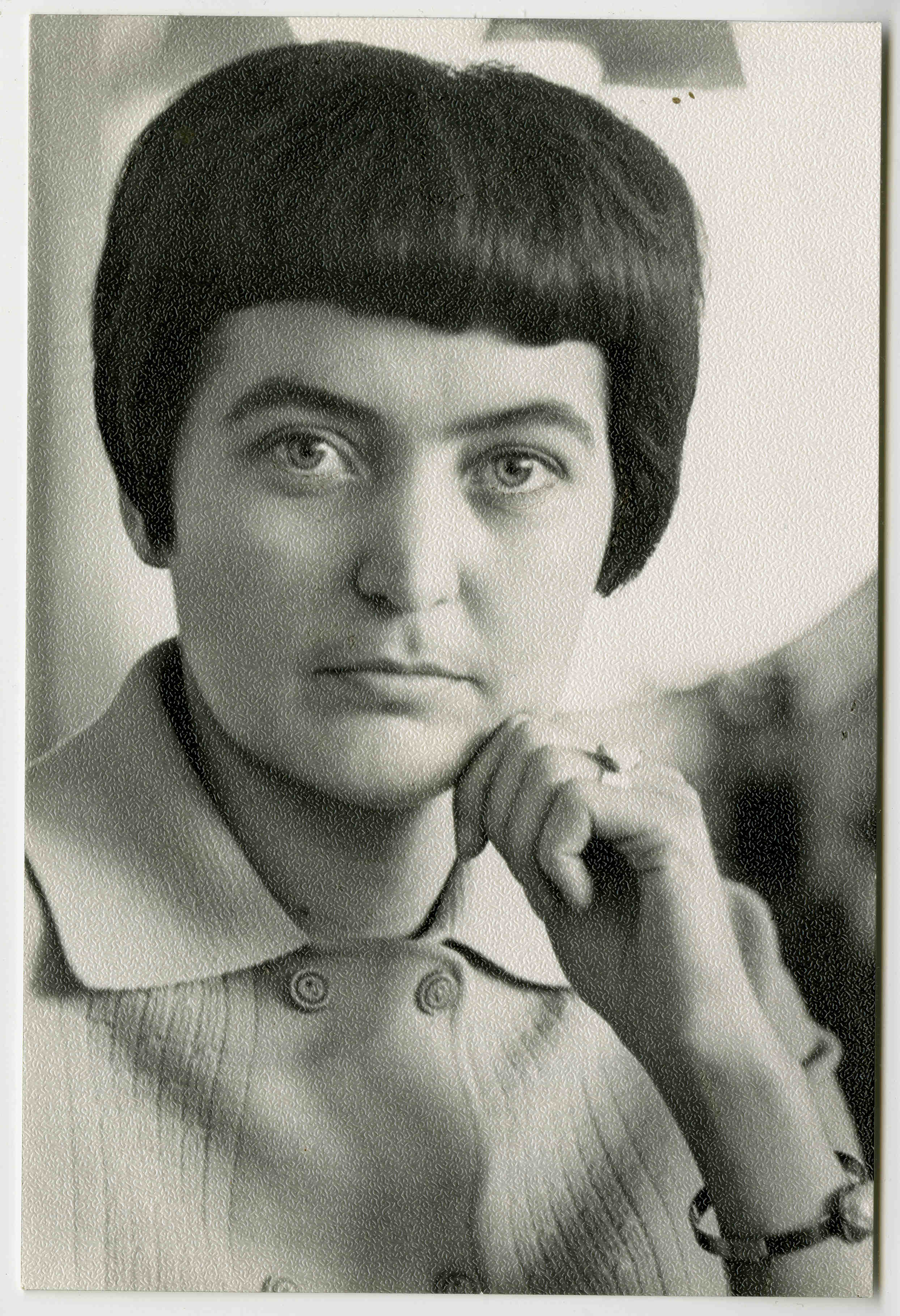
Aimée Beekman
Aimée Beekman (until 1953 Aimée Malla, born 20. IV 1933) is chiefly known as a prose author.
Beekman was born in Tallinn, graduated from Secondary School number 4 in Tallinn and from the All-Union State Institute of Cinematography in Moscow as a camerawoman. From 1956 to 1960 she worked as a camerawoman at Tallinnfilm, and thereafter concentrated on her career as a writer of fiction. She made her debut in 1959 with short prose in periodicals. She was one of the most widely travelled Soviet Estonian authors, whose creative career began with the travel book about Italy, Plastmassist südamega Madonna (‘Madonna with a Plastic Heart’, 1963), a representative example of Soviet travel writing. She has been a member of the Estonian Writers’ Union since 1966. For the novel Väntorel (‘The Barrel Organ’, 1970) she won the annual J. Smuul literature prize of the Estonian SSR; for the novel Kuradilill (‘Devil’s Flower’, 1973) the Eduard Vilde Prize in literature; for the Mirjami triloogia (‘The Mirjam Trilogy’, 1976) and Viinakuu (‘October’, 1975) the Estonian SSR State Prize. In 1978 she was made a Merited Writer of the Estonian SSR. Aimée Beekman was married to the writer and translator Vladimir Beekman (1929-2009).
Beekman’s work can be divided into two parts: the psychologically realistic novels from early in her career, and the works since the seventies, novels to be taken as models or warnings. The early trend is represented by novels such a Väikesed inimesed (‘Little People’, 1964), Kaevupeegel (‘Mirror in a Well’, 1966) and Vanad lapsed (‘Old Children’, 1972), which were combined as the ‘Mirjam Trilogy’ (1976), having the same location and some of the same characters. The author’s childhood and wartime experiences are depicted in the novels Väikesed inimesed and Vanad lapsed, in which the slum districts of Tallinn, the life of the petty bourgeoisie in the thirties and the war years are revealed through the eyes of the child Mirjam. In Kaevupeegel Mirjam appears episodically; the main character is a revolutionary who has come back to Estonia; the action, related in the present tense, takes place in the early forties. The film world is glimpsed in Valgete vareste parv (‘Flock of White Crows’, 1967), in which the author likewise draws on her personal experience.
Also composing a trilogy are Kuradilill (1973), Sugupuu (‘Family Tree’, 1977) and Tihnik (‘The Thicket’, 1980), in which the problems of the traditional home are dealt with in a depiction of the generations of a single family; the setting of Vaseküla village and its folklore create a mythical-magical atmosphere.
Of a notably more complicated structure is the novel Kartulikuljused (‘Potato Bells’, 1968), in which a grotesque view is taken of events in 1944 in an Estonian coastal village, where opportunities to escape across the sea are being sought. The grotesque was becoming one of Beekman’s characteristic trademarks, while an ever more prominent part is played by estrangement of reality in model situations. The novel Väntorel (1970) represents Beekman as the author of a warning novel, presenting contemporary urban life through a trick mirror, where the central place is occupied by the obsession with material things and steadily increasing bureaucracy. The same problems are examined in the novel Viinakuu (1975). Vabajooks (‘Freewheel’, 1982) has been described as a dystopia in which technological development and humanity are in opposition.
Beekman’s best-known, most discussed and controversial novel is Valikuvõimalus (‘Possibility of Choice’, 1978), defined as an admonitory novel, which considers women’s emancipation. The main character is the educated and independent Regina, approaching her thirtieth year and having moved from the capital to a small town, who, for lack of a better choice, marries a local drunkard who is a master craftsman, but acquires children with men who are carefully chosen and checked for good health. A feature film (Regina, 1989, director Kaljo Kiisk) was based on the novel.
In her latest novels, Proovielu (‘A Trial Life’, 2008) and Ulavere (‘Ulavere’, 2009), the author charts the course of modern society and human relationships.
A. K. (Translated by C. M)
Books in Estonian
Novels
Väikesed inimesed. Tallinn: Eesti Riiklik Kirjastus, 1964, 192 lk. [2. trükk: 1976.]
Kaevupeegel. Tallinn: Eesti Raamat, 1966, 252 lk. [2. trükk: 1976.]
Valgete vareste parv. Tallinn: Eesti Raamat, 1967, 272 lk. [2. trükk: 1983.]
Kartulikuljused. Tallinn: Eesti Raamat, 1968, 296 lk. [2. trükk: 1983.]
Väntorel. Tallinn: Eesti Raamat, 1970, 200 lk. [2. trükk: 1983.]
Keeluala. Tallinn: Eesti Raamat, 1971, 247 lk.
Vanad lapsed. Tallinn: Eesti Raamat, 1972, 200 lk. [2. trükk: 1976.]
Kuradilill. Tallinn: Eesti Raamat, 1973, 223 lk [2. trükk: 1984.]
Viinakuu. Tallinn: Eesti Raamat, 1975, 183 lk. [2. trükk: 1983.]
Sugupuu. Tallinn: Eesti Raamat, 1977, 340 lk.
Valikuvõimalus. Tallinn: Eesti Raamat, 1978, 207 lk. [Järgnevad tükid: 1983, 2010, 2016.]
Tihnik. Tallinn: Eesti Raamat, 1980, 308 lk.
Vabajooks. Tallinn: Eesti Raamat, 1982, 223 lk.
Loobumisvõimalus. Tallinn: Eesti Raamat, 1985, 144 lk.
Peavari. Tallinn: Eesti Raamat, 1989, 332 lk.
Hundimurdja. Tallinn: Eesti Raamat, 1994, 100 lk.
Proovielu. Tallinn: Varrak, 2008, 199 lk.
Ulavere. Tallinn: Tänapäev, 2009, 198 lk.
Lastekirjandus
Sõnni Siim. Tallinn: Eesti Raamat, 1970, 92 lk. [2. trükk: 1987.]
Kurb hobune. Tallinn: Eesti Raamat, 1975, 17 lk. [2. trükk: 2008.]
Tondinahad. Tallinn: Eesti Raamat, 1977, 144 lk. [2. trükk: 1983.]
Päästekoer Walter. Tallinn: Tea Kirjastus, 2009, 36 lk.
Unenägude lõvi. Tallinn: Tea Kirjastus, 2010, 39 lk.
Metsasigudik ja printsessi koer. Tallinn: Tea Kirjastus, 2011, 36 lk.
Harakate talvepralle. Tallinn: Tea Kirjastus, 2012, 52 lk.
Reisikirjad
Plastmassist südamega madonna. Tallinn: Eesti Riiklik Kirjastus, 1963, 64 lk.
Vladimir Beekman, Aimée Beekman, Euroopa ristteedel. Tallinn: Eesti Raamat, 1965 200 lk.
Selected and collected works
Mirjami triloogia. Tallinn: Eesti Raamat, 1976, 512 lk. [Sisu: ‘Väikesed inimesed’, ‘Kaevupeegel’, ‘Vanad lapsed’.]
Valitud romaanid I. Kartulikuljused. Valgete vareste parv. Tallinn: Eesti Raamat, 1983, 464 lk.
Valitud romaanid II. Väntorel. Viinakuu. Valikuvõimalus. Tallinn: Eesti Raamat, 1983, 495 lk.
Valitud romaanid III. Kuradilill. Sugupuu. Tihnik. Tallinn: Eesti Raamat, 1984, 702 lk.



